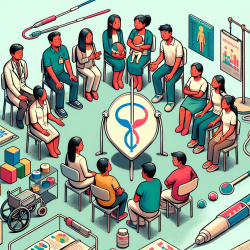Introduction
In the dynamic world of special education, staying informed about the latest research and trends is crucial for practitioners. A recent study titled "Attitudes of Filipino Parents of Children with Down Syndrome on Noninvasive Prenatal Testing" offers valuable insights into the perceptions of Filipino parents regarding noninvasive prenatal testing (NIPT) for Down syndrome (DS). This blog explores the study's findings and provides actionable steps for practitioners to enhance their skills and understanding in this area.
Key Findings of the Study
The study, conducted by de Castro-Hamoy et al., utilized thematic analysis of in-depth interviews with Filipino parents of children with DS. The participants acknowledged the value of NIPT in providing early diagnosis, which aids in emotional, mental, spiritual, and financial preparation. However, concerns were raised about the potential anxiety and thoughts of termination that early detection might provoke, despite abortion being illegal in the Philippines.
Implementing the Research Outcomes
Practitioners can leverage the findings of this study to improve their skills and approach in the following ways:
- Enhance Counseling Skills: Understanding the emotional journey of parents receiving a DS diagnosis can help practitioners offer more empathetic and supportive counseling. Practitioners should be trained to provide balanced information that includes both the challenges and joys of raising a child with DS.
- Promote Support Networks: Encourage parents to join support groups where they can connect with others who have similar experiences. This community support can be invaluable in helping parents navigate their journey.
- Facilitate Access to Resources: Assist parents in accessing resources and information about DS, including medical care, therapy options, and educational support. Being a conduit for information can empower parents to make informed decisions.
- Advocate for Comprehensive Pre-Test Counseling: Emphasize the importance of pre-test counseling to ensure parents understand the purpose of NIPT and the implications of the results. This can help mitigate anxiety and promote informed decision-making.
Encouraging Further Research
While this study provides valuable insights, further research is needed to explore the long-term impacts of NIPT on societal attitudes toward DS and other disabilities. Practitioners are encouraged to engage in or support research initiatives that examine these broader implications, contributing to a more inclusive and understanding society.
Conclusion
The study on Filipino parents' attitudes toward NIPT for DS highlights the complexity of emotions and decisions faced by families. By implementing the outcomes of this research, practitioners can enhance their skills, offer better support to families, and contribute to a more informed and compassionate approach to prenatal testing and special needs education.
To read the original research paper, please follow this link: Attitudes of Filipino parents of children with Down syndrome on noninvasive prenatal testing.










